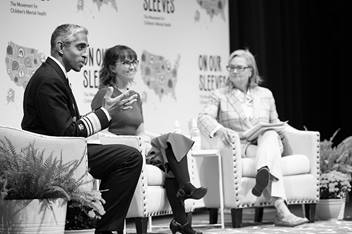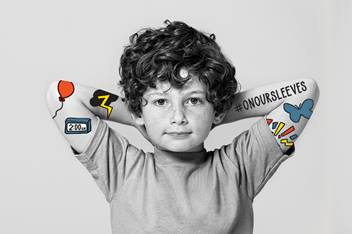Supporting Every Child’s Mental Health: A Conversation with Dr. Ariana Hoet

Ariana Hoet, PhD, is the executive clinical director of The Kids Mental Health Foundation and a leading national voice for child and family well-being.
Her passion for advocacy arose from her early life; as an immigrant to the United States from Venezuela, she moved among seven different schools and dealt with depression as a teenager. Now, as a pediatric psychologist and mother of two young children, she focuses on helping kids and their families learn supportive strategies to improve mental health and resilience.
The Collaboratory talked with Dr. Hoet about children’s well-being and the work of The Kids Mental Health Foundation
Collaboratory: Most children (and most adults) experience ups and downs. How is the current behavioral health crisis among young people different from what we have seen before?
Dr. Hoet: The academic world had seen the trends coming. For example, the United States Centers for Disease Control and Prevention had data from 2009 through 2019 that showed alarming increases in mental health concerns.
I think the pandemic is what opened the eyes of everyone since it exacerbated the mental health concerns of kids. There has been more awareness since then, from the U.S. Surgeon General’s advisory on youth mental health to the American Academy of Pediatrics calling children’s mental health a public health crisis.
The community is also feeling the difficult impact of a shortage of mental health providers. Many parents and teachers are worried about kids but cannot find them the support they need quick enough.
Collaboratory: Regarding that shortage of providers, how can we as a society help everyone who needs help receive it?
Dr. Hoet: Workforce development is important. There are so many things we can do in that area, including helping make education accessible and affordable, and starting recruitment of future mental health providers earlier. We should start exposing middle and high schoolers to this as a career path.
We also have to realize that not every child needs a specialist therapist or psychiatrist. We can train the community and other health care providers (for example, pediatricians) to support children with mild symptoms or those who are at risk, so that specialty mental health providers are more open for those with moderate to severe symptoms.
Most importantly, we have to focus on brief models of intervention and prevention. We can decrease the need for treatment if we take a public health approach and make mental wellness information access able to all. That’s why what we do at Kids Mental Health Foundation is so important. We do not want to wait until there’s a crisis or concern to talk about mental health.
Collaboratory: How much of this work can be done at the national level, and how much is one-on-one?
Dr. Hoet: I think the answer to this is similar to what I said above. The promotion work can be done at a national level. The more adults with the knowledge on how to raise healthy kids, the better. However, children who need more specialty mental health services, do need the one-on-one treatment.
I think about it in the same way I think about physical health. With physical health, we know that children need their veggies and to move their bodies to be physically healthy. However, even the children with the best health habits may end up sick and still need a medical doctor.
The same thing can be said about mental health. The science tells us there are many tools and skills we can use to promote mental wellness in children, and these should be used daily. However, some kids will still experience mental illness, and they’ll need a mental health professional.
Collaboratory: In what ways do your personal experiences influence your work?
Dr. Hoet: I love that through graduate school, I was able to learn the science of what treatments work to help children’s mental health. However, it is through my personal experiences that I am able to understand the community I treat and know ways to adapt the treatments so that they’re culturally relevant.
I believe my experience allows me to connect closely with the patients I serve because I have gone through what many of them have.
Collaboratory: What is the future for The Kids Mental Health Foundation?
Dr. Hoet: We want every adult to know how they can interact and talk to the children in their lives to raise to support their mental wellness. We want every adult to know what to do when a concern comes up and how to support their child.
Kids don’t come with instruction manuals. We want adults to know they can turn to us for that guidance. We take the science – we take what we know works – and we make it accessible to everyone.
Published September 2024



